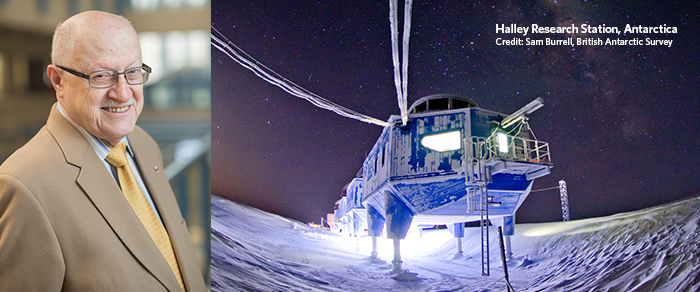

Dr. Peter Suedfeld’s research collaborations are out of this world.
UBC Psychology Professor Emeritus Peter Suedfeld has spent his career exploring human resiliency to understand how we cope with the world around us. He is one of the pioneering researchers in the field of Restricted Environmental Stimulation Therapy (REST) and in his field research he has studied the reactions and adaptation of crews in the Antarctic, the Canadian High Arctic, and in space vehicles, as well as survivors of the Holocaust and other traumatic events. His research findings were among the first to emphasize the positive aspects and consequences of these experiences.
Now Dr. Suedfeld is embarking on a new research mission – one that is funded by the Canadian Space Agency (CSA). The CSA announced today that Suedfeld is the recipient of a grant fund that will support his portion of a multi-centre, multi-investigator research project that investigates the psychological aspects of isolation inherent to spaceflight. Suedfeld is the Principal Investigator of the project, along with 18 other European collaborators. Using two Antarctic stations, it will develop unique tools and protocols to measure how people in an isolated, confined environment interact. The results will identify early signs of distress or poor adaptation, so that interventions can begin quickly, to enhance wellbeing in spacecraft.
Suedfeld says stress levels are difficult to measure cleanly. “There are two major methods; one is self-report and the other is a variety of physiological measures. These are intrusive and can induce stress,” says Suedfeld. “Measuring voice variables such as pitch, volume, speech rate – along with the content analyses of weekly diaries – is not reactive nor stressful.”
“Depending on the results we may have a step toward measuring the level of stress among a wide range of people besides Antarctic personnel, such as astronauts, submarine crews, and deployed members of the armed forces,” adds Suedfeld.
Pioneering research
Dr. Suedfeld is well suited to lead this team; the impact of his work on the international research community is significant. He has been active in space psychology research and in Canadian Space Agency (CSA) and National Aeronautics and Space Administration (NASA) committees for several decades. He has served as a consultant to NASA on issues such as optimum capsule design for maximum habitability and psychological health, and he has collaborated with the CSA on issues of capsule design and long-term habitability. Most recently, Suedfeld has conducted an archival project, funded by the CSA, to look into the positive and negative aspects of the subjective experience of space flight.
The psychological effects and the behavioural issues associated with living in space missions have been under-valued until recently. Suedfeld has successfully urged the space agencies to consider and assess methods for enhancing astronauts’ psychological well-being, rather than focus entirely on treating adverse effects.
Along with Dr. Phyllis Johnson (Department of Sociology, UBC), Suedfeld recently completed a multi-year study of retired Russian cosmonauts. They have now completed a CSA-funded preparatory year for research whose participants will be astronauts living on the International Space Station (ISS). The ISS study has entered its operational phase and is recruiting astronaut participants from Canada and around the world.
“Human space flight is not only continuing, it’s expanding,” says Suedfeld. “This includes including setting up a permanently staffed station on the moon, the establishment of the Mars One space mission, and after our successful lobbying, the International Space Station (ISS) has been extended to 2024. We need to better understand the effects of being in isolated environment for long periods.”
Related
- Canadian Space Agency Press Release: Simulating space on Earth to help protect astronauts
- UBC News: From Antarctica to outer space: studying the impact of isolation
- UBC Psychology professors receive distinguished Canadian Psychological Association awards at annual conference
- Peter Suedfeld a Featured Fellow in Canadian Geographic
- Canada’s Most Versatile Psychologist: Dr. Peter Suedfeld


